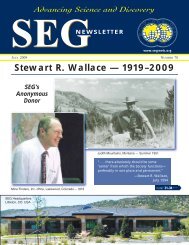Download - Society of Economic Geologists
Download - Society of Economic Geologists
Download - Society of Economic Geologists
Create successful ePaper yourself
Turn your PDF publications into a flip-book with our unique Google optimized e-Paper software.
16 SEG NEWSLETTER No 65 • APRIL 2006SEG NEWSMENTORINGThe Mentoring column is a regular feature <strong>of</strong> the SEG Newsletter, with contributions <strong>of</strong> up to 700 words. If you would like to contributeto this column via an interview or have a personal anecdote, please contact Steve Garwin (Steve.Garwin@geoinformex.com) or LucyChapman (Lucy.Chapman@jcu.edu.au).Jared Lubben (SEG 2006): An Interviewby Steve Garwin (SEG 1996 F)Jared Lubben graduated from WinonaState University with a B.S. (geology) in2000, and in 2004 completed an M.S.(economic geology) at the University <strong>of</strong>Nevada, Las Vegas,on the Betze-PostCarlin-type gold system located in northcentralNevada. Betze-Post is a Barrickownedmine and Jared had the opportunityto address critical questions regarding orefluid properties, sources, and migrationpathways. At the time, he was working fulltimeas an exploration geologist for PlacerDome. Throughout his two years at PlacerDome, Jared had been charged with theresponsibilities <strong>of</strong> project developmentalong the Battle Mountain-Eureka goldtrend located in north-central Nevada.Jared was interviewed by Steve Garwin overthe telephone and by e-mail in February.Q: When did you know that you wanted tobe a geologist? Was there an experiencethat led to this decision?A: My exposure to geoscience before collegewas minimal. My interest in geologywas sparked by my enrollment in an introductoryclass my freshman year. Throughlearning basic geologic principles and discoveringthe unique opportunities geologistsare provided with in terms <strong>of</strong> projects,travel, and working environments, I discoveredthat geology was the career pathfor me.Q: What attracted you to work in the mining& exploration industry in Nevada? Is itall that you thought it would be?A: I am most interested in field methodsand mineral system genesis. This combinationled me into exploration. My attractionto exploration in Nevada developedthrough my thesis work on Carlin-typedeposits and has been most <strong>of</strong> what Ithought it would be. Most surprising is thegeneration gap between experienced andnew incoming geologists. The average agedifference is approximately 20 years. Ithink this shows a glaring need for strongmentoring relationships in today’s industry.Q: Do you see yourself following a careerin the exploration businesses? If so, whatdrives you in this direction?A: The thrill and challenge <strong>of</strong> the hunt iswhat drives me to exploration and keepsmy interest strong. Furthermore, explorationinvolves problem solving in a teamenvironment. I get great satisfaction fromcontributing to a group that may somedaybe responsible to finding the next majorsuccessful mine. The rewards can be overwhelming.Q: You have worked in industry for almosttwo years now; what are your experienceswith mentoring?A: Early on, I experienced situations wherepositive interaction took place betweensenior geologists and myself, both in the<strong>of</strong>fice and field environments. However, Ifeel that the increased pace <strong>of</strong> the explorationindustry has limited my exposure tomentoring activities. Since my recent promotionto project geologist, it has been difficultto gain constructive evaluation <strong>of</strong> myproject work.Q: Where do you see yourself pr<strong>of</strong>essionallyin 10 years?A: In 10 years I hope to have had a continuouscareer in mineral exploration and fillan exploration management position for acompany that is considered one <strong>of</strong> theleaders in the industry. Over those 10 yearsI hope to have successfully transformedfrom a mentee into a solid leader whoplaces high value on mentoring studentsand young pr<strong>of</strong>essionals. I also wish tocontribute to the consistent flow <strong>of</strong> newyoung talent into the mining industry.Q: What would you like to see more <strong>of</strong> inthe actions <strong>of</strong> companies today that wouldattract young geoscientists like yourself tothe industry?A: Throughout my undergraduate studiesand into my graduate work, I found myselfas one <strong>of</strong> only a few students workingtowards a degree in economic geology andone <strong>of</strong> a few students hoping to obtain ajob in the mining industry. Increasing theawareness <strong>of</strong> what the mining industrycan <strong>of</strong>fer young geologists would changethis trend. A conscious effort to interactwith potential mineral explorationistsfrom undergraduate level would greatlyincrease the number <strong>of</strong> students interestedin economic geology. I fear the miningindustry has a stigma that turns students<strong>of</strong>f to any potential exploration career.This may solely be based on a lack <strong>of</strong>understanding. Thus, informing studentsabout opportunities early in their schoolingcould develop their desire to work inthe mining industry.I think companies could <strong>of</strong>fer programsto junior geologists that enable continuedlearning and development including mentoringin the work place as well as bysponsorships on field trips and relatedshort courses. The learning curve is steepand based on discussions with other younggeologists, many new hires are not fullyprepared for the challenges this businesspresents.Q: How could industry contribute to universityto help prepare graduating studentsfor future work?A: Short courses and field trips on topicsthat specifically address the skill set neededto successfully conduct mineral exploration.Provide summer employmentopportunities in a setting where studentsfulfill roles that normal employees fill.Furthermore, provide them with the sameresponsibilities that a normal junioremployee would have while providingexperienced support (mentoring) throughoutthe process. This, I think, is critical toincreasing the number <strong>of</strong> students interestedin economic geology and would helpmaintain a solid influx <strong>of</strong> young qualitypr<strong>of</strong>essionals into industry.Q: It was stated by James MacDonald(mentoring column, January 2005) that asystem “where the mentor and mentee areplaced together by a structured process isdoomed for failure.” This article goes on tostate that corporations should be challengedwith creating “an environment inwhich mentoring occurs naturally andinformally.” What is your opinion?A: I agree and disagree with the statements.I fear that with the speedy pace <strong>of</strong>the mineral exploration business, a systemwhere the onus <strong>of</strong> mentoring young geologistsis strictly on the mentor may get “lostin the shuffle,” so to speak. On the otherhand, based on my experiences, a mentorcannot be forced to provide leadership andknowledge for mentees. I think a balanceshould be found in the work place wherethere is time for mentoring. It is veryimportant to me to work for a companythat holds mentoring as a core value(something that I have found not to be acommon in the exploration business). Itshould be up to management to develop asystem that creates a working environmentthat promotes mentoring <strong>of</strong> young pr<strong>of</strong>essionals.Thank you Jared!If you would like to get in touch with Jared, orwould like to contribute to this column via aninterview, please contact Steve Garwin or LucyChapman (contact information above). 1






